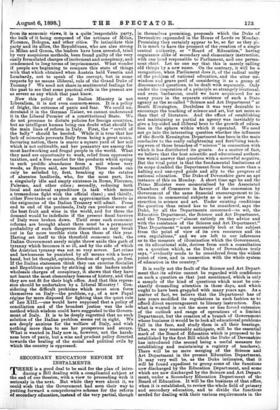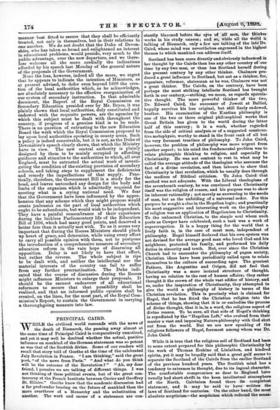SECONDARY EDUCATION REFORM BY INSTALMENTS. T HERE is a good deal
to be said for the plan of intro- ducing a Bill dealing with a complicated subject at the end of one Session, with a view to proceeding with it seriously in the next. But while they were about it, we could wish that the Government had seen their way to putting forward a comprehensive scheme for the reform of secondary education, instead of the very partial, though in themselves promising, proposals which the Duke of Devonshire expounded in the House of Lords on Monday. Promising they certainly appear to be, so far as they go. It is much to have the prospect of the creation of a single central authority, or "Board of Education," having cognisance alike of secondary and elementary instruction, with one head responsible to Parliament, and one perma- nent chief. Let no one say that this is merely calling old things by a new name. On the contrary, it will be a recognition, when Parliament does it, of the radical unity of the problem of national education, and the utter un- wisdom and grave peril of considering it as a group of disconnected questions, to be dealt with separately. Only under the inspiration of a principle so strangely irrational, and even barbarous, could we have acquiesced for so many years in the separate existence of such a State agency as the so-called "Science and Art Department" at South Kensington. Doubtless it was very desirable to encourage the teaching of science and art, but not more so than that of literature. And the effect of establishing and maintaining so partial an agency was inevitably to give a lop-sided and illiberal bent to the growth of educa- tion in the sphere within which it operated. We need not go into the interesting question whether the influence of the South Kensington Department has been in the main conducive to the really enlightening and fertilising teach- ing even of those branches of "science" in connection with which it has distributed its grants. As a matter of fact, we believe that the best scientific and educational authori- ties would answer that question with a sorrowful negative. But the vital point is that the fundamental limitations of its scope disabled the Department from being more than a halting and one-eyed guide and ally to the progress of national education. The Duke of Devonshire gave an apt instance of this on Monday. A short time ago he and the Prime Minister were memorialised by the Associated Chambers of Commerce in favour of the concession by Government of the same financial encouragement to in- struction in commercial subjects as is now given to in- struction in science and art. Under existing conditions the question thus raised has to be considered, says the Duke, by all the Departments concerned—to wit, the Education Department, the Science and Art Department, and the Treasury—" almost entirely on the advice and with the assistance of the Science and Art Department." That Department "must necessarily look at the subject from the point of view of its own resources and its own regulations," and we are left to our inferences as to the measure of illumination which the Government, on its educational side, derives from such a consultation on a question which, as the Duke of Devonshire truly says, "evidently needs to be considered from the widest point of view, and in connection with the whole system of education in the country."
It is really not the fault of the Science and Art Depart- ment that its advice cannot be regarded with confidence on such a question as that just mentioned, which is only a sample of the kind of questions which must be con- stantly demanding attention in these days, and which ought to have been grappled with many years ago. As a matter of fact, we believe that the Department has of late years modified its regulations in such fashion as to afford direct encouragement to literary instruction. But what is wanted is not the more or less forced extension of the outlook and range of operations of a limited Department, but the creation of a branch of Government whose business it would be to look all educational problems full in the face, and study them in all their bearings. That, we may reasonably anticipate, will be the essential mark of the Board of Education which is proposed to be established by the first Bill which the Duke of Devonshire has introduced (the second being a useful measure for establishing and maintaining a registry of teachers). There will be no mere merging of the Science and Art Department in the present Education Department. It may very well be, as the Duke intimates, that it will be found expedient to group some of the functions now discharged by the Education Department, and some which are now discharged by the Science and Art Depart- ment, under a Secondary Education Department of the Board of Education. It will be the business of that office, when it is established, to review the whole field of primary and secondary education, and. to divide the functions needed for dealing with their various requirements in the manner best fitted to secure that they shall be efficiently treated, not only in themselves, but in their relations to one another. We do not doubt that the Duke of Devon- shire, who has taken so broad and enlightened an interest in educational problems, would preside, very much to the public advantage, over the new departure, and we there- fore welcome all the more cordially the indications afforded by his speech last Monday of the general nature of the proposals of the Government.
None the less, however, indeed all the more, we regret that he appears to indicate the intention of Ministers, as at present advised, to defer even beyond 1899 the crea- tion of the local authorities which, as he acknowledges, are absolutely necessary to the effective reorganisation of our system of secondary instruction. In that admirable document, the Report of the Royal Commission on Secondary Education presided over by Mr. Bryce, it was plainly shown that local authorities, duly constituted and endowed with the requisite powers, are the agencies by which this subject must be dealt with throughout the country, if progress of a genuine kind is to be made. There is no question of entrusting to the new Education Board the work which the Royal Commission proposed to lay upon local authorities operating in county areas. Such a policy is indeed conceivable, but it is not, as the Duke of Devonshire's speech clearly shows, that which the Ministry have in view. The new central authority is plainly designed by them to be mainly occupied in affording guidance and stimulus to the authorities to which, all over England, must be entrusted the actual work of investi- gating the condition of the existing provision of secondary schools, and taking steps to supplement the deficiencies and remedy the imperfections of that supply. Prac- tically, therefore, the Government Bill is a study for the head, and leaves untouched any design for the body and limbs of the organism which is admittedly required for meeting what is a crying national need. We fear that the Government have been influenced by the appre- hension that any scheme which they might propose would create jealousies on the part of local authorities which ought to be subordinate, but would wish to be independent. They have a painful remembrance of their experience during the luckless Parliamentary life of the Education Bill of 1896, which had many good points, and deserved a better fate than it actually met with. To us it seems very important that during the Recess Ministers should pluck up heart of grace, and determine, while using every effort to carry all possible opinion with them, not to postpone the introduction of a comprehensive measure of secondary education reform in the vain hope of disarming all opposition. Delay is not likely to have that effect, but rather the reverse. The whole subject is ripe to be dealt with, and neither the intellectual nor the material interests of the country can fail to suffer from any further procrastination. The Duke indi- cated that the course of discussion during the Recess might influence Ministers to enlarge their proposals. It should be the earnest endeavour of all educational reformers to secure that that possibility shall be realised, and that an informed public opinion shall be created, on the lines, for the most part, of the Royal Com- mission's Report, to sustain the Government in carrying a thoroughgoing measure into law.



































 Previous page
Previous page